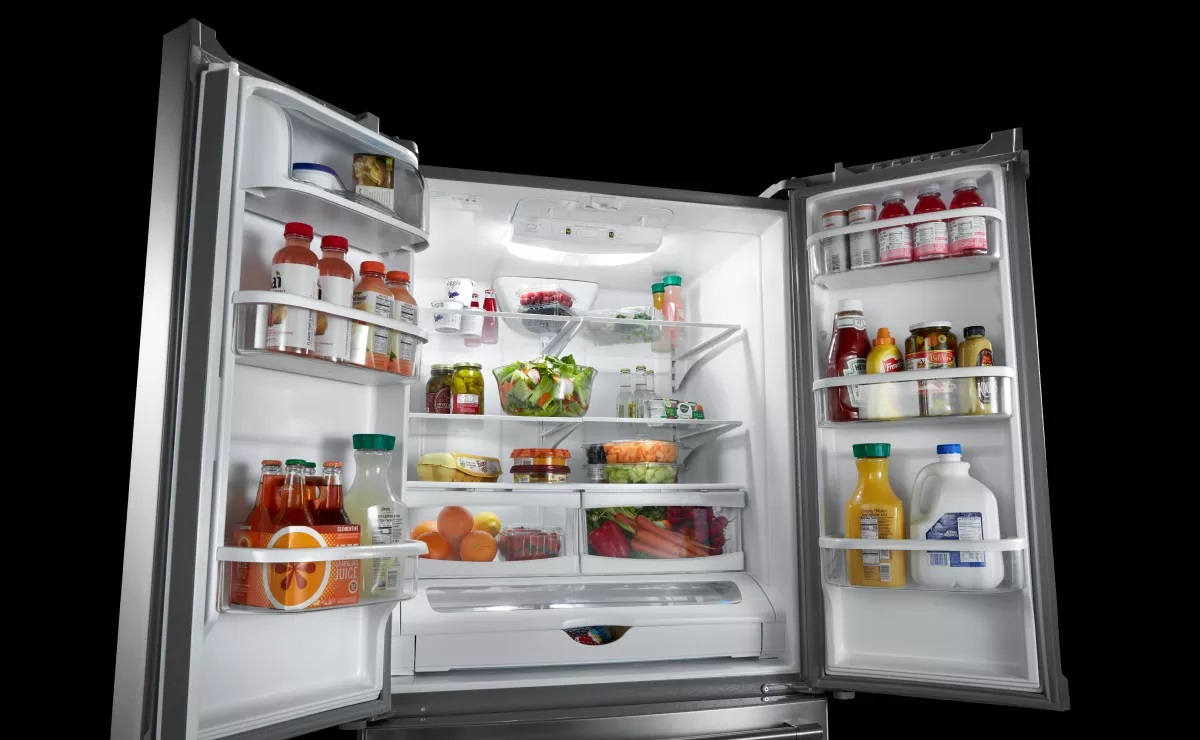
Refrigerators are a staple in modern homes, serving as a cornerstone of food preservation and convenience. These remarkable appliances have a rich history and have evolved significantly over time. Understanding the inner workings of refrigerators, their impact on daily life, and the latest technological advancements can provide valuable insights into their significance. In this article, we'll delve into 20 fascinating facts about refrigerators, shedding light on their journey from humble beginnings to becoming an indispensable part of our lives. From their environmental impact to the latest smart features, these facts will offer a comprehensive look at the world of refrigeration technology. So, let's embark on an intriguing exploration of these cool companions that have revolutionized the way we store and enjoy our food.
Key Takeaways:
- Refrigerators have come a long way since 1913, revolutionizing food storage and evolving with smart features to enhance kitchen efficiency and connectivity.
- Proper maintenance and organization are key to maximizing the performance and longevity of refrigerators, ensuring food safety and minimizing waste.
The first home refrigerator was invented in 1913.
The concept of a refrigerator for home use was brought to life by Fred W. Wolf Jr. and his team at the Kelvinator Company. This invention revolutionized food storage and preservation in households, paving the way for modern refrigeration technology.
Refrigerators have become an indispensable part of modern kitchens.
With the ability to keep food fresh and safe to consume for extended periods, refrigerators have transformed the way we store and manage our food supplies. From preserving leftovers to storing perishable items, refrigerators play a crucial role in maintaining food quality and minimizing waste.
The first refrigerator to see widespread use was the General Electric "Monitor-Top" refrigerator.
Introduced in 1927, the General Electric "Monitor-Top" refrigerator marked a significant advancement in home refrigeration technology. Its distinctive design, with a compressor mounted on top of the cabinet, set the standard for future refrigerator models.
The introduction of Freon revolutionized refrigerator technology.
In the 1930s, the use of Freon as a refrigerant in home refrigerators brought about a major breakthrough. This innovation greatly improved the efficiency and safety of refrigeration systems, setting the stage for the modern refrigerators we use today.
The 1950s saw the rise of the automatic defrost refrigerator.
With the introduction of automatic defrost technology, refrigerator maintenance became much more convenient for homeowners. This feature eliminated the need for manual defrosting, making refrigerator upkeep simpler and less time-consuming.
The energy efficiency of refrigerators has significantly improved over the years.
Advancements in refrigeration technology have led to the development of energy-efficient models that consume less power while delivering optimal cooling performance. This focus on energy efficiency aligns with the growing emphasis on sustainable and eco-friendly practices.
Refrigerators come in various styles and configurations.
From traditional top-freezer models to modern French door refrigerators, consumers have a wide range of options to choose from based on their specific needs and preferences. The diversity in refrigerator styles allows for customization to suit different kitchen layouts and design aesthetics.
Smart refrigerators are equipped with innovative features.
The integration of smart technology in refrigerators has led to the emergence of intelligent appliances with features such as touchscreen displays, Wi-Fi connectivity, and advanced temperature control. These smart refrigerators offer enhanced convenience and connectivity for modern households.
The invention of the ice maker transformed refrigerator functionality.
The incorporation of built-in ice makers in refrigerators eliminated the need for separate ice trays and simplified the process of producing ice for beverages and culinary use. This feature has become a standard convenience in many modern refrigerator models.
Refrigerators with water dispensers provide added convenience.
The inclusion of water dispensers in refrigerators allows for easy access to chilled water without the need for a separate water filtration system or pitcher. This feature enhances the overall functionality of the refrigerator as a hydration hub in the kitchen.
Proper organization and storage in refrigerators help prolong the freshness of food.
By utilizing designated compartments for different food categories and adhering to recommended storage practices, individuals can optimize the shelf life and quality of items stored in the refrigerator. This strategic approach to organization contributes to minimizing food waste and maintaining a well-stocked kitchen.
Refrigerators play a vital role in food safety.
Maintaining the appropriate temperature in the refrigerator is essential for preventing food spoilage and minimizing the risk of foodborne illnesses. Understanding and adhering to food storage guidelines can help ensure that the refrigerator serves as a reliable tool for preserving food safety.
The maintenance of refrigerator seals is crucial for optimal performance.
The integrity of the door seals, also known as gaskets, is essential for maintaining the efficiency of the refrigerator. Damaged or worn seals can lead to energy loss and compromised cooling capabilities, emphasizing the importance of regular seal inspection and maintenance.
Refrigerators require proper ventilation for efficient operation.
Ensuring adequate airflow around the refrigerator is necessary to facilitate heat dissipation from the condenser coils and promote optimal cooling performance. Proper ventilation contributes to the overall longevity and effectiveness of the refrigerator.
Energy-saving tips can help reduce refrigerator power consumption.
Simple practices such as minimizing the frequency of door openings, allowing hot foods to cool before placing them in the refrigerator, and keeping the refrigerator away from direct sunlight can contribute to energy conservation and reduced electricity bills.
Refrigerators have evolved to incorporate eco-friendly features.
In response to environmental concerns, modern refrigerators often include eco-friendly elements such as LED lighting, energy-efficient compressors, and refrigerants with lower environmental impact. These eco-conscious features align with the industry's commitment to sustainability.
Refrigerator maintenance should include regular cleaning and defrosting.
Cleaning the interior and exterior of the refrigerator, along with periodic defrosting if applicable, is essential for preserving hygiene, preventing odors, and ensuring the longevity of the appliance. Proper maintenance contributes to the overall performance and sanitation of the refrigerator.
The disposal of old refrigerators requires responsible handling.
Due to the presence of refrigerants and other potentially harmful components, the proper disposal of old refrigerators is crucial for environmental safety. Recycling programs and professional disposal services offer sustainable solutions for retiring refrigerators.
Smart refrigerators can enhance kitchen efficiency and connectivity.
With features such as inventory tracking, recipe suggestions, and integration with smart home systems, smart refrigerators contribute to streamlining kitchen operations and enhancing the overall culinary experience for users.
Refrigerators continue to evolve with technological advancements.
The ongoing innovation in refrigeration technology, including developments in energy efficiency, smart capabilities, and sustainable design, reflects the continuous evolution of refrigerators to meet the changing needs and expectations of modern consumers.
In conclusion, the "20 Refrigerator Facts" shed light on the historical milestones, technological advancements, and practical considerations associated with this essential kitchen appliance. From its humble beginnings in the early 20th century to the integration of smart features in contemporary models, the refrigerator has continuously adapted to meet the demands of modern lifestyles while prioritizing efficiency, convenience, and sustainability. As consumers embrace the diverse array of refrigerator options available, understanding the fundamental aspects of refrigeration technology and maintenance practices becomes increasingly valuable for optimizing the performance and longevity of this indispensable kitchen companion.
Conclusion
Refrigerators have evolved from simple iceboxes to technologically advanced appliances that are essential in modern homes. Understanding the various aspects of refrigerators, from their history and energy efficiency to their environmental impact, is crucial for making informed choices. By delving into the fascinating world of refrigeration, we gain a deeper appreciation for the innovation and engineering behind these everyday marvels. Whether it's exploring the latest smart features or appreciating the environmental considerations, the refrigerator continues to be a cornerstone of convenience and sustainability in our lives.
FAQs
What are the key factors to consider when buying a refrigerator?When purchasing a refrigerator, it's important to consider the size, energy efficiency, and special features that align with your needs. Additionally, assessing the layout of your kitchen space can help determine the most suitable refrigerator style and configuration.
How can I maximize the energy efficiency of my refrigerator?To optimize the energy efficiency of your refrigerator, ensure proper ventilation around the appliance, set the temperature to the recommended levels, and regularly clean the coils. Additionally, minimizing the frequency of door openings and promptly fixing any seal issues can contribute to energy savings.
Refrigerators have come a long way since their inception, transforming kitchens and revolutionizing food storage. If you're in the market for a new fridge, consider the benefits of side by side models. Curious about more refrigerator trivia? Check out our collection of fascinating fridge facts. And for sports fans, don't miss the incredible story of William "Refrigerator" Perry, a football legend with a unique nickname.
Was this page helpful?
Our commitment to delivering trustworthy and engaging content is at the heart of what we do. Each fact on our site is contributed by real users like you, bringing a wealth of diverse insights and information. To ensure the highest standards of accuracy and reliability, our dedicated editors meticulously review each submission. This process guarantees that the facts we share are not only fascinating but also credible. Trust in our commitment to quality and authenticity as you explore and learn with us.


